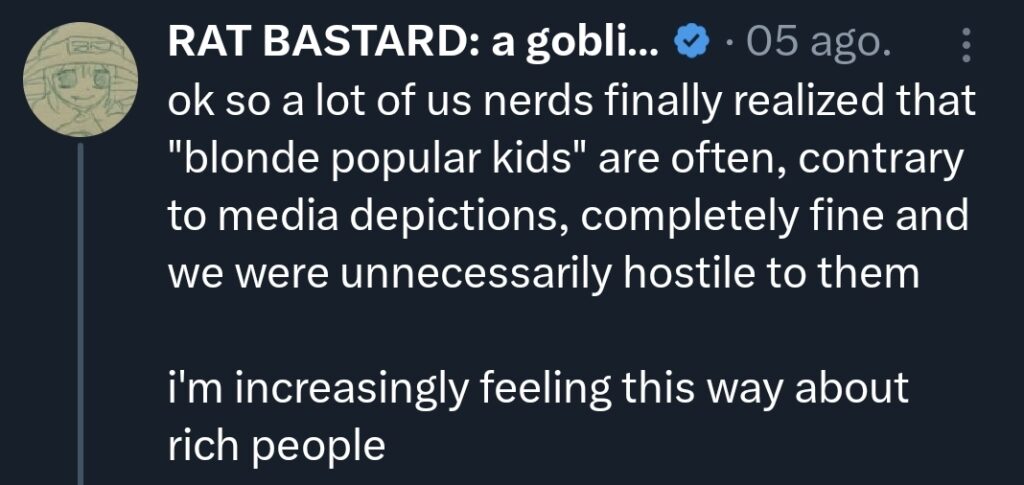This post will sit somewhere between reflection and analysis. It’s also half-baked because the path was more the result of a stream of consciousness rather than written around a central theme. Provoked by the tweet below, I want people to know that most undue prejudices are simply markers for class in one way or another. Even most positive biases are markers for class. Class is truly the last divider of us all, and it has to be in the system that we live in.

Capitalism needs people to value money above all else, and it enforces this pedestal by putting necessities such as shelter, food, and often even water behind a paywall. It also creates a cult-like following of people who worship the almighty dollar and put their god is above all else — not just in their lives, but in ours. Powerful institutions curate the news that we hear, the opinions that we see, and the entertainers we watch with vague but intentional (financial) goals.
.
stereotyping wealth
Let’s take degrees for example. People often see degrees as a sign of intelligence, but they don’t always correlate. More than that, education in one area does not grant you authority in them all. It will never make sense to me that a brain surgeon ran for POTUS. Even within degrees, we have tiers. Make no mistake, many universities offer similar levels of education, but what universities are selling is the capital potential. It’s why universities publish starting salaries for their graduates.
In the above tweet, the author says that the “blonde popular kid” was unfairly maligned (presumably in media.) Now from what I’ve seen, the “blonde popular kid” was always rich. In real life, the popular kids are rich far more often than they’re blonde. Early 2000s depictions of high schools often married the two images, but the common denominator is always wealth — or at least the facade of it.
Capital determines societal ideals more often than not. In some societies, pale skin differentiates you from those who work lower paid jobs outside. In others, tan skin means that you have the privilege of seeing daylight outside your 9-5. Thinness (at least the right kind) implies access to healthier groceries, medical care, and membership gyms. Education has already been commodified to the point that alma maters are class indicators.
The elephant in the room of capitalistic prejudice is racism. It might seem a far leap to attribute the evils of race science to capitalism, but there’s no way to separate race science from the start of the trans-Atlantic slave trade. While prejudice and enslavement have existed since the dawn of time, there was never such a broadly disseminated hierarchy. All in the pursuit of capital.
.
commodifying stereotypes
If we go back to the 1400s, the papal blessing of the transatlantic slave trade starts with the proselytization of Africans and ends with Europe looting the continent. These papal bulls are unique in that they enslave, dispossess, and colonize a noncontiguous empire. Oceans separated the perpetrators and the victims, and this space gave Europeans further reach and more separation to create a power differential.
Historically, people have always used “in” and “out” groups. Tribalism is essentially built on this concept. Being in the “in” group has always brought a sense of belonging and preferential treatment. But now the “in” group profits from the “out” group, and this changes the game of power.
When the “in” and “out” groups are neighbors, “in” vs. “out” can boil down to superficialities and even erode with time. However, when the “out” group is far away, it’s easier to orient this space as them below you. The further they are from what we know, the easier it is to project any image. The transatlantic slave trade traversing water rather than land was more conducive to a clear separation between the colonizers and the colonized. This traversing of oceans also allowed European ideas of race and Africa to be spread globally.
While empires existed long before modern capitalism, the sun didn’t truly avoid setting on an empire until European colonization. We can pretend that the pope cared about non-Christian souls, but there’s a reason the Vatican glitters with stolen gold. Capital was driving these expeditions, and almost nowhere was (or is) safe from capitalists’ insatiable greed. Knowing that everything the light touched was theirs, colonialists “enlightened” the world. This age of enlightenment has a shadow without precedent.
.
the age of the internet
Before telecommunications, we didn’t have as much broadly disseminated information, and it took longer for messages to spread. Christianity took 1900 years to reach the same number of followers as Cristiano Ronaldo. These communication systems were often either developed or broadly established because of military and imperialistic goals. The empire embeds its ideology in its communication.
While the methods evolved, many of the goals remained the same. The largest empires in this world exploited so much of the planet, in part so no one had the resources to fight them. They also suppressed local cultures and restricted communication to further suffocate any potential for questioning or rebellion. And they’re still doing it.
Fortunately, words survive regimes. I can read, publish, and interact with people who operate outside of a capitalistic paradigm. The internet was a product of public funding, and is potentially the best weapon we have against capitalism. This is also why net neutrality is so important. Unfortunately, the internet oligarchs also know that.
.
becoming one with the capitalgorithm
In the early days of the internet, social networks were fractured among many forums and blogging sites; they also tended to be a bit more targeted, either topically or geographically. When we opened AIM, the only 4 people on it were people we met in real life. Chat rooms were varied and wild, and moderation was nascent, if it existed at all.
Now big FAANG-ed companies dominate the internet, and new players are routinely acquired or priced out of existence. This has simultaneously connected us with more people than ever before and limited the ways in which we connect with people—both linguistically and technologically. Moderation and censorship are changing language at breakneck speed.
The internet has brought us a whole new terrain to till and to shill. Like the earth itself, its abundance appeals to exploitative opportunists. The reason for all of this is, once again, the pursuit of capital.
.
why tech can’t save us… yet
Recently someone showed me aggregation theory, and once again I’m lamenting the lack of humanities knowledge within tech. Capitalism in its rawest form always favors and will trend towards monopolies. The players changed but the game stayed the same. Aggregation theory is a symptom of capitalism, and it’s not even unique within American history, let alone world history.
In many ways, technology is stagnating in the United States, and “aggregation theory” is a large part of why. Shareholder value motivates companies more than societal value. Many of our best and brightest minds are in golden handcuffs writing algorithms and decks to extract value rather than create it in our lives.
Most technology is built on open-source software on some level. The love of (awesome) technology motivates many technologists and fuels the desire to advance tech. In order to use technology for good, we have to use good technology—and that shift is going to be difficult. Big tech embedded itself in every part of our lives, in large part with the dependency on smartphones.
.
new world order
There are people smarter than me who have seen these problems and proposed solutions. Any solution that benefits the common folk will likely require far more input than one person can produce. Capitalism favors individualism because it promotes unbridled consumerism and reduces organized resistance.
Nothing grows forever though, and there will be a world after capitalism. I don’t know what it will look like, but it is as inevitable as endless growth is impossible. Neither monopolies nor monarchies last forever. In the meantime, I guess I’ll try to change what I can, starting with perspectives.




